Related Research Articles

Louis-Hector Berlioz was a French Romantic composer and conductor. His output includes orchestral works such as the Symphonie fantastique and Harold in Italy, choral pieces including the Requiem and L'Enfance du Christ, his three operas Benvenuto Cellini, Les Troyens and Béatrice et Bénédict, and works of hybrid genres such as the "dramatic symphony" Roméo et Juliette and the "dramatic legend" La Damnation de Faust.
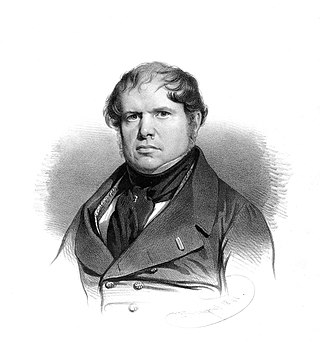
François-Joseph Fétis was a Belgian musicologist, critic, teacher and composer. He was among the most influential music intellectuals in continental Europe. His enormous compilation of biographical data in the Biographie universelle des musiciens remains an important source of information today.
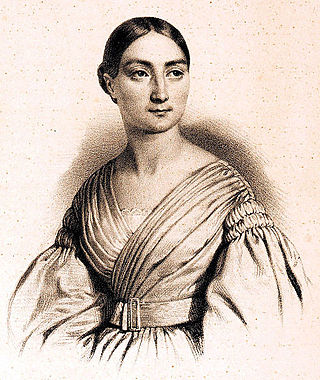
Cornélie Falcon was a French dramatic soprano who sang at the Opéra in Paris. Her greatest success was creating the role of Valentine in Meyerbeer's Les Huguenots. She possessed "a full, resonant voice" with a distinctive dark timbre and was an exceptional actress. Based on the roles written for her voice her vocal range spanned from low A-flat to high D, 2.5 octaves. She and the tenor Adolphe Nourrit are credited with being primarily responsible for raising artistic standards at the Opéra, and the roles in which she excelled came to be known as "falcon soprano" parts. She had an exceptionally short career, essentially ending about five years after her debut, when at the age of 23 she lost her voice during a performance of Niedermeyer's Stradella.

Harold en Italie, symphonie avec un alto principal, as the manuscript describes it, is a four-movement orchestral work by Hector Berlioz, his Opus 16, H. 68, written in 1834. Throughout, the unusual viola part represents the titular protagonist, without casting the form as a concerto. The movements have these titles, alluding to a programme:
- Harold in the mountains
- March of the pilgrims
- Serenade of an Abruzzo mountaineer
- Orgy of bandits
David Adam Cairns is a British journalist, non-fiction writer and musician. He is a leading authority on the life of Berlioz.
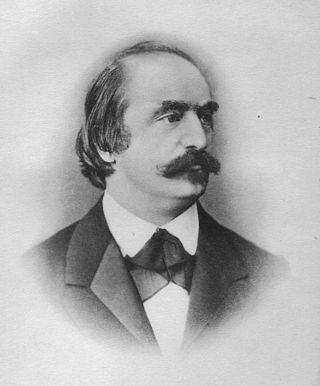
The Oxford Companion to Music defines music criticism as "the intellectual activity of formulating judgments on the value and degree of excellence of individual works of music, or whole groups or genres". In this sense, it is a branch of musical aesthetics. With the concurrent expansion of interest in music and information media over the past century, the term has come to acquire the conventional meaning of journalistic reporting on musical performances.
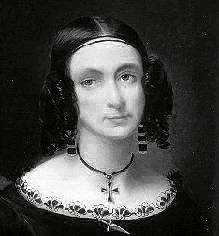
Louise-Angélique Bertin was a French composer and poet.

Les nuits d'été, Op. 7, is a song cycle by the French composer Hector Berlioz. It is a setting of six poems by Théophile Gautier. The cycle, completed in 1841, was originally for soloist and piano accompaniment. Berlioz orchestrated one of the songs in 1843, and did the same for the other five in 1856. The cycle was neglected for many years, but during the 20th century it became, and has remained, one of the composer's most popular works. The full orchestral version is more frequently performed in concert and on record than the piano original. The theme of the work is the progress of love, from youthful innocence to loss and finally renewal.

François-Henri-Joseph Blaze, known as Castil-Blaze, was a French musicologist, music critic, composer, and music editor.

Grande symphonie funèbre et triomphale, Op. 15, is the fourth and last symphony by the French composer Hector Berlioz, first performed on 28 July 1840 in Paris. It is one of the earliest examples of a symphony composed for military band.
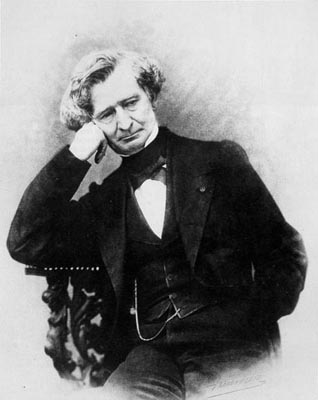
The Mémoires de Hector Berlioz are an autobiography by French composer Hector Berlioz. First serialised in several contemporary journals including Journal des Débats and Le Monde Illustré, their compilation into one book was completed on New Year's Day, 1865 and after much proof-reading, an initial printing of 1200 was carried out in July. After distributing some copies to certain friends, they were put aside until Berlioz died. After Berlioz's death in 1869, they were published in 1870. They provide an extremely colourful, if biased, account of Berlioz's life, and are invaluable to anyone with an interest in the artistic life of the time.
Moritz Adolf Schlesinger, generally known during his French career as Maurice Schlesinger, was a German music editor. He is perhaps best remembered for inspiring the character of M. Arnoux in Gustave Flaubert's novel Sentimental Education.

Stradella is a Grand Opera in five acts by Louis Niedermeyer to a libretto by Emile Deschamps and Émilien Pacini. Based on a highly romanticized version of the life of the composer Alessandro Stradella (1639–1682), it was premiered at the Paris Opera on 3 March 1837.

The Revue musicale was a weekly musical review founded in 1827 by the Belgian musicologist, teacher and composer François-Joseph Fétis, then working as professor of counterpoint and fugue at the Conservatoire de Paris. It was the first French-language journal dedicated entirely to classical music. In November 1835 it merged with Maurice Schlesinger's Gazette musicale de Paris to form Revue et gazette musicale de Paris, first published on 1 November 1835. It ceased publication in 1880.

Valentine d'Aubigny is an opéra comique in three acts composed by Fromental Halévy to a libretto by Jules Barbier and Michel Carré. It premiered in Paris on 26 April 1856 at the Théâtre de l'Opéra-Comique. The comic story is set in Fontainebleau and Paris at the beginning of the 18th century and revolves around mistaken identities and the machinations of the Chevalier de Boisrobert and Sylvia, an actress at the Théâtre-Italien, who try but ultimately fail to prevent the marriage of Gilbert de Mauléon and Valentine d'Aubigny.

José Melchor Gomis y Colomer was a Spanish Romantic composer.

Joseph Louis d'Ortigue was a French musicologist and critic. A specialist in liturgical music and a conservative Catholic of ultramontane and royalist leanings, he was a close friend of both Berlioz and Liszt. His most influential work was Dictionnaire liturgique, historique, et theorique de plain-chant et le musique d'église, but he also wrote for many of the most prominent periodicals of the day, including Journal des débats and Le Ménestrel where he was the editor-in-chief from 1863 until his sudden death at the age of 64.

Alexandre Montfort was a French classical composer. His works included instrumental music, art songs and six operas. He was awarded the Prix de Rome in composition in 1830.
References
- ↑ Cairns, passim
- ↑ Macdonald, Hugh. "Berlioz, (Louis-)Hector", Grove Music Online, Oxford University Press, 2001. (subscription required)
- 1 2 Murphy, p. 111
- ↑ "HBerlioz.com". HBerlioz.com. 18 July 1997. Retrieved 13 March 2010.
- ↑ Cairns, p. 95
- 1 2 3 "HBerlioz.com". HBerlioz.com. Retrieved 13 March 2010.
- 1 2 3 4 Cairns, p. 96
- 1 2 Cairns, p. 85
- 1 2 Cairns, p. 97
- 1 2 Cairns, p. 98
- ↑ Wright Roberts (I), pp. 65, 69 and 71
- ↑ Wright Roberts (II), pp. 138 and 140
- ↑ Bent, p. 41
- 1 2 Hector Berlioz. "GreenManReview.com". GreenManReview.com. Archived from the original on 14 February 2009. Retrieved 13 March 2010.
- ↑ HBerlioz.com Archived 16 March 2009 at the Wayback Machine
- ↑ "University of Chicago Press". Press.uchicago.edu. Archived from the original on 13 December 2007. Retrieved 13 March 2010.
- ↑ "Scena.org". Scena.org. 10 December 2003. Retrieved 13 March 2010.